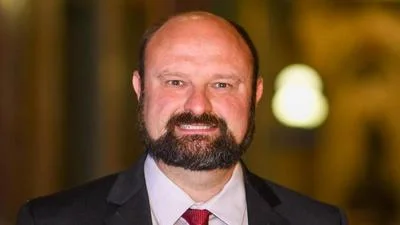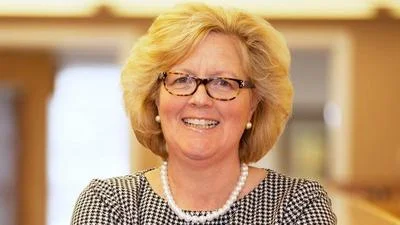HSHS St. Joseph's Hospital issued the following announcement on Nov. 27.
November is American Diabetes Month and the health care experts at HSHS St. Joseph’s Hospital Highland are working to increase awareness about diabetes as well as provide education on the treatment of potential or existing chronic wounds for people living with diabetes.
According to the Centers for Disease Control and Prevention (CDC), an estimated 30.3 million people in the United States (9.4 percent of the population) have diabetes, including 7.2 million who are unaware they are living with the disease. The percentage of adults with diabetes increases with age, reaching a high of 25.2% among those aged 65 years or older. In addition to age, risk factors for diabetes include diet, activity level, obesity and heredity.
Type 2 diabetes is the most common form of diabetes, meaning that your body doesn’t use insulin properly. It is also largely preventable through regular physical activity and a healthy and balanced diet.
“Eating a healthy balanced diet is less complicated than you think,” says Megan Stanley, RN, diabetes educator for St. Joseph’s. “Eat plenty of non-starchy vegetables—half your plate. Choose lean sources of protein such as fish, poultry and lean cuts of pork and beef. Avoid sources of added sugars especially sugar-sweetened beverages like regular soda, sweet tea, and energy drinks.”
Knowing the symptoms of diabetes can be helpful in the prevention and treatment of the disease. Symptoms can be mild and go unnoticed, but they include:
- Frequent urination
- Feeling thirsty
- Feeling hungry, even when eating
- Extreme fatigue
- Blurry vision
- Cuts and bruises that are slow to heal
- Weight loss
- Tingling, pain or numbness in hands and feet
Managing and understanding diabetes can be a challenge, so St. Joseph’s Hospital Highland offers multiple opportunities to support people living with diabetes, with diabetes educators providing nutritional counseling and teaching diabetes classes. The hospital offers individual and group Diabetes Self-Management Education programs, and the hospital program’s recognition by the American Diabetes Association means that your visit may be covered by insurance.
Stanley shared, “Whether you’re beginning your journey with diabetes, struggling day to day with uncontrolled blood sugar, or simply wanting to learn about different management techniques, you’ll find the answers and support you need here. Our Diabetes Education team works together to help you understand your diabetes and manage it through medication, healthy eating, and being more active.”
Free services are also available through St. Joseph’s Highland’s Diabetes Support Group to provide tools and tips on how to handle the more complex and difficult task of diabetes in the context of real life. The Diabetes Support Group is open to those with diabetes and their family members. Caregivers are also invited. The next session is scheduled for December 13 at 2 p.m. in Sullivan Conference Room. For more information, contact Megan Stanley at 618-526-5743 or megan.stanley@hshs.org. Registration is not required to attend.
Preventing Diabetic Chronic Wounds
Those living with diabetes need to be especially careful about potential or existing chronic wounds since the leading cause of lower-limb amputations are not caused by accidents. High blood sugar levels, poor circulation, immune systems issues, nerve damage and infection may contribute to a diabetic foot ulcer.
With America’s diabetic population expected to nearly double by 2030, HSHS St. Joseph’s Wound Care Center, a member of the Healogics network, is educating communities about the risks and the facts associated with diabetic foot ulcers.
- Approximately 25% of people living with diabetes will develop a foot ulcer.
- As many as 40% of people with a healed diabetic foot ulcer will develop a new ulcer within a year.
- An estimated 14 to 24% of people with foot ulcers will experience an amputation. Of those who have undergone one amputation, 55% will require amputation on the second leg.
The HSHS St. Joseph’s Wound Care Center recommends the following to help prevent diabetic foot ulcers:
- Stop smoking immediately.
- Comprehensive foot examinations each time you visit your health care provider (at least four times a year).
- Daily self-inspections of the feet, or have a family member perform the inspection.
- Regular care of the feet including cleaning toenails and taking care of corns and calluses.
- Choose supportive, proper footwear (shoes and socks).
- Take steps to improve circulation such as eating healthier and exercising on a regular basis.
Contact HSHS St. Joseph’s Wound Care Center to learn more about diabetic foot ulcers or if you have a wound that will not heal. For more information or to schedule a consultation, call 618-651-2502. Patients may be seen with or without a physician's referral.
About Healogics, Inc.
Headquartered in Jacksonville, Fla., Healogics is the nation’s leading provider of advanced wound care services. Healogics and its affiliated companies manage a nationwide network of Wound Care Centers® and cared for over 300,000 new patients last year through an integrated network of partner hospitals and Wound Care Centers, academic medical centers, and other post‐acute sites. Healogics utilizes evidence‐based standards of care to chronic wound healing to treat an underserved and growing patient population. For more information, please visit www.healogics.com.
Original source can be found here.






 Alerts Sign-up
Alerts Sign-up